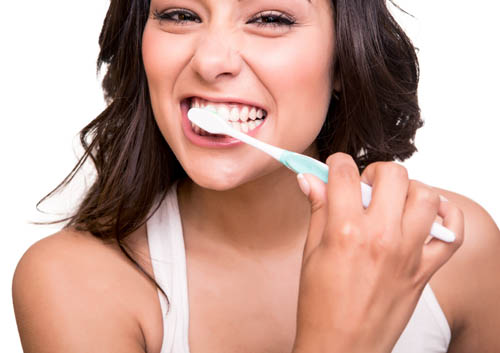National Brush Day
November 5th, 2025

October 31—Halloween. Fourth Thursday in November—Thanksgiving. And, in between these two favorite autumn holidays, we have November 1—National Brush Day!
Okay, okay. Maybe National Brush Day isn’t quite as well-known as Halloween or Thanksgiving, but we take any opportunity to celebrate your dental health. So, let’s celebrate brushing!
After all, brushing is vital for healthy teeth and gums.
- Brushing is your first line of defense against plaque. Plaque forms all day long. Plaque sticks to your teeth. Plaque is filled with bacteria which produce cavity-causing acids. Brushing regularly means plaque won’t stay on your teeth long enough to cause serious tooth decay.
- Brushing is also important for your gum health. Angling your brush to carefully clean plaque and bacteria away from your gum line helps prevent gum disease.
- Tooth decay is the most common chronic disease among children and young adults. The leading cause of tooth loss in adults is gum disease. Good brushing habits help prevent tooth decay and gum disease—a win/win when it comes to your oral health.
To make the most of the time you spend brushing, let’s take a moment to review some basics on National Brush Day.
Are You Brushing Correctly?
- Big, broad brushstrokes aren’t the answer. Instead, use small up-and-down or circular strokes over each tooth and each tooth surface—outside, inside, and on the flat surfaces of your molars.
- Because plaque forms all day, you need to keep on top of it. Brushing at least twice a day for two minutes each time is a good general rule. Drs. Peter Vogel, Vijal Vadecha will let you know the best brushing schedule for your individual needs.
- Brushes are meant to clean, not to scrub. You don’t need a heavy hand for cleaner teeth.
- Which also means, there’s almost never a good time to brush with a hard-bristled brush. Hard bristles, along with hard brushing, can actually damage your enamel and gum tissue. Stick to a soft-bristled brush for dental TLC.
Are You Taking Care of Your Brush?
- To clean away bacteria and viruses you might have picked up during the day, wash your hands before brushing and flossing.
- Shake your brush dry when you’re finished and then let it air dry upright with the handle pointing down. Only use a case for travel, and make sure it has air holes for ventilation. (Bacteria thrive in a wet environment.)
- If your toothbrush lives in the bathroom, close the toilet seat before flushing to avoid airborne particles.
- No matter how close you are to your family members or roommates, don’t share your toothbrush. Sharing doesn’t mean caring in this case—it means sharing germs. Your brush should keep a healthy distance from other brushes as well.
- And no matter how fond you are of your brush, be prepared to replace it often! Most brushes last three to four months at best, because bristles start to fray and can’t clean effectively after several months of use.
It’s no coincidence that National Brush Day comes right after Halloween, the most sugar-filled holiday of them all. So, how can we mark the occasion?
Treat yourself to a new toothbrush! Take a moment to review your brushing habits. If you have young children at home, spend two minutes brushing together to make sure they’re brushing effectively–they might even have some tips for you! Brushing your teeth properly is one of the easiest things you can do to protect your oral health. That’s something to celebrate!
Courting Disaster
October 29th, 2025

When we think of sports and dental damage, we naturally think of hockey and football. But when it comes to the actual number of dental injuries suffered each year, vying for top seed is the game of basketball.
How is this possible? After all, football and hockey are categorized as “collision sports”! But along with the helmets, shin guards, and padding, these teams often require mouthguards—and this makes all the difference. Studies have shown that an increase in the number of players wearing mouthguards means a decrease in the number of oral traumas.
And while basketball isn’t considered a collision sport, it is a contact sport. Basketball is a combination of running, jumping, hard surfaces, and solid bodies. And elbows. We can’t forget elbows. So a broken or even a knocked out tooth isn’t, unfortunately, all that unusual when bodies in motion meet hard surfaces—or other players. But there are other dental dangers as well. Besides tooth injuries, oral injuries can involve:
- The ligaments and bone structures holding teeth in place
- Bones in the upper and lower jaw
- Delicate gum, tongue, and mouth tissue.
You need a solid defensive strategy to reduce the severity of oral injuries or to prevent them from happening altogether. The best play in your playbook? Wearing a mouthguard!
Choosing the right guard is key. There are three common options, and you can choose the model which works best for you:
- Stock guards, which are ready-made guards in pre-formed shapes and sizes. You can buy them over the counter in drug stores and sporting goods stores. Because these guards aren’t shaped to fit your teeth and mouth specifically, they can be less protective (and harder to speak around).
- “Boil-and-bite” guards can also be purchased, and can provide a closer fit. After warming the guard in hot water as directed, you place it in your mouth and bite down firmly to mold it to your teeth.
- Drs. Peter Vogel, Vijal Vadecha can make you a mouthguard which is designed and crafted specifically for your use. Because this guard is custom-fitted, it provides better protection for your teeth and mouth. Patients often find custom guards much more comfortable and more durable as well.
Mouthguards are most effective when you wear them on the court and care for them off the court. This means avoiding a few flagrant fouls.
- Dirty play
All those moist nooks and crannies inside your mouthguard are a perfect environment for bacteria, mold, and plaque buildup. You should clean your mouthguard carefully every time you wear it, and let it air dry before popping it back in the case. Ask Drs. Peter Vogel, Vijal Vadecha for advice on getting your guard and its case their cleanest.
- Failure to sub out in a timely fashion
Mouthguards don’t work if they’re damaged. If you notice any warping, breakage, or jagged or sharp edges, contact our Anthem office for a replacement. If a guard doesn’t fit you properly, it doesn’t protect you, and sharp edges can irritate or injure delicate mouth tissue.
- Unnecessary roughness
Your mouthguard protects you, so don’t forget to protect it! Keep your guard in its case when you’re not wearing it to save it from dirt, damage, and disappearance.
If you know your basketball, you know your guard game can make all the difference. Even though a mouthguard might not be mandatory on your team, that doesn’t mean it’s not essential. Remember that basketball is a contact sport, and protect yourself with a mouthguard whenever you play.
Proper Brushing Techniques
October 22nd, 2025

Brushing your teeth properly removes the food particles and bacteria that can lead to tooth decay and gum disease. However, you do not want to scrub your teeth or gums heavily. A heavy hand can lead to tooth and gum erosion, as Drs. Peter Vogel, Vijal Vadecha and our staff see all too often.
You should also use a soft bristle toothbrush to avoid damaging the surface of your teeth. Make sure the head of the brush fits in your mouth, because if it is too large you will not be able to reach all tooth surfaces. Follow these steps to ensure you are brushing properly.
- Use a small amount of toothpaste on your brush. The recommendation is a pea-sized amount or thin strip on the bristles.
- Hold your toothbrush at a 45-degree angle to the surface of your teeth, angling towards your gums. Use a circular motion on all exterior tooth surfaces, and avoid back-and-forth “scrub” brushing.
- Once you have cleaned the outer surfaces, hold the brush vertically and clean the inner teeth surfaces — the side of your teeth that face your tongue. Do not forget the inner surfaces of your front teeth.
- Finally, finish by cleaning all the chewing surfaces of your teeth. You need to maintain a gentle touch, but make sure you get into the full depth of your molars. The entire process should take about two minutes.
Drs. Peter Vogel, Vijal Vadecha and our staff recommend changing your toothbrush every three to four months for best results. Do not forget to clean your tongue, which helps remove excess bacteria from your mouth. Special brushes are available just for cleaning your tongue, and they are easy to use.
Proper care of your teeth also requires flossing on a regular basis. Flossing can be performed before or after you brush. Following up with a quality mouthwash will provide you with even more protection. Do not be afraid to ask the Daisy Mountain Dentistry team for tips on proper brushing and flossing.
What’s in Your Backpack?
October 17th, 2025

Hiking is a great way to appreciate the beauty of nature, to get away from the stresses of daily life, and, of course, to challenge yourself physically. While you’re packing away your sunscreen and your first aid kit, do your body another favor—take a minute to include some lightweight, dental-friendly items.
- Snacks
When you’re exerting yourself, snacks that provide quick energy on the go are a must. Granola, trail mix, energy bars, candy, dried fruit—these are the foods we think of as trail food, and we generally get that quick energy boost from the sugars and starches they contain. As it happens, Drs. Peter Vogel, Vijal Vadecha and our team strongly recommend you pick snack options other than sugary and starchy foods. Why? Because many sugars and starches provide oral bacteria the food they need to produce acids. These acids weaken enamel and damage our teeth. And these common trail foods often have the added “bonus” of sticking to the teeth, leaving acids even more opportunity to attack. Don’t give up the energy boost you need for a safe hike, but do yourself and your teeth a favor and look for the healthiest granola, energy bars, and gorp out there.
Other suggestions for trail treats that are also a treat for teeth? If you need a chocolate pick-me-up, try dark chocolate. Dark chocolate has more caffeine that milk chocolate and less sugar. (It has other health benefits as well that you might want to look up after your hike.) If you like nuts and seeds, take softer nuts, or sliced nuts—a good source of energy and not likely to provide as much stress on your teeth when you’re in the field. (Shell them beforehand—don’t ever use your teeth as a nutcracker!) Similarly, if you take seeds, leave the shells at home. If you like crackers, try whole grains. Looking for protein? How about a tuna pouch instead of chewy beef jerky?
- Hydrate
Water is always the go-to beverage. Pre-hydrate even before setting out, and have plenty on hand for your trek. Many hiking sources suggest two cups of fluids per hour of activity. (And in hot or humid weather or at high altitudes, you could need even more.) There are actually hiking water calculators online, which can give you a good estimate on how much you’ll need for your trip, taking into account your age, weight, level of activity, and other factors. Because water can get heavy, plan a lengthy hike around the availability of fountains or other clean water sources if necessary.
What if you feel the need for more than water? If you are getting a good workout, you’re probably losing electrolytes. Generally, sports drinks aren’t on the dental menu. They tend to be loaded with sugar and carbs—good for energy, bad for teeth. Sports drinks can be as acidic and hard on your enamel as sodas. But if you need those electrolytes on a long hike, don’t feel guilty. There are many options—choose the healthiest one for you and your workout level.
- Be prepared!
While you are probably already packing a mini-first aid kit for long hikes, think about a lightweight dental emergency kit as well. These are readily available online and in outdoors stores, and usually contain supplies like cotton balls, dental floss, oral pain relievers, even temporary fillings, in a lightweight bag.
And once your hike is done? Rehydrate, and don’t forget to treat your teeth to a good brushing and flossing when you get home.
Got all that? Great! Now, go take a hike!


